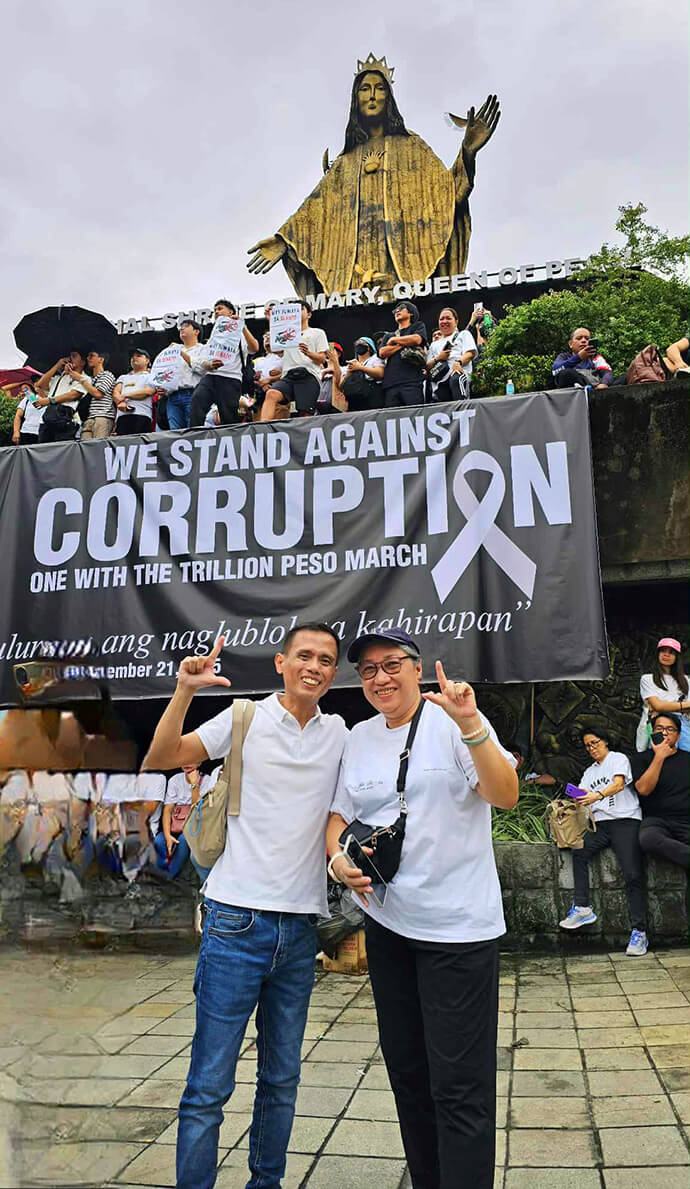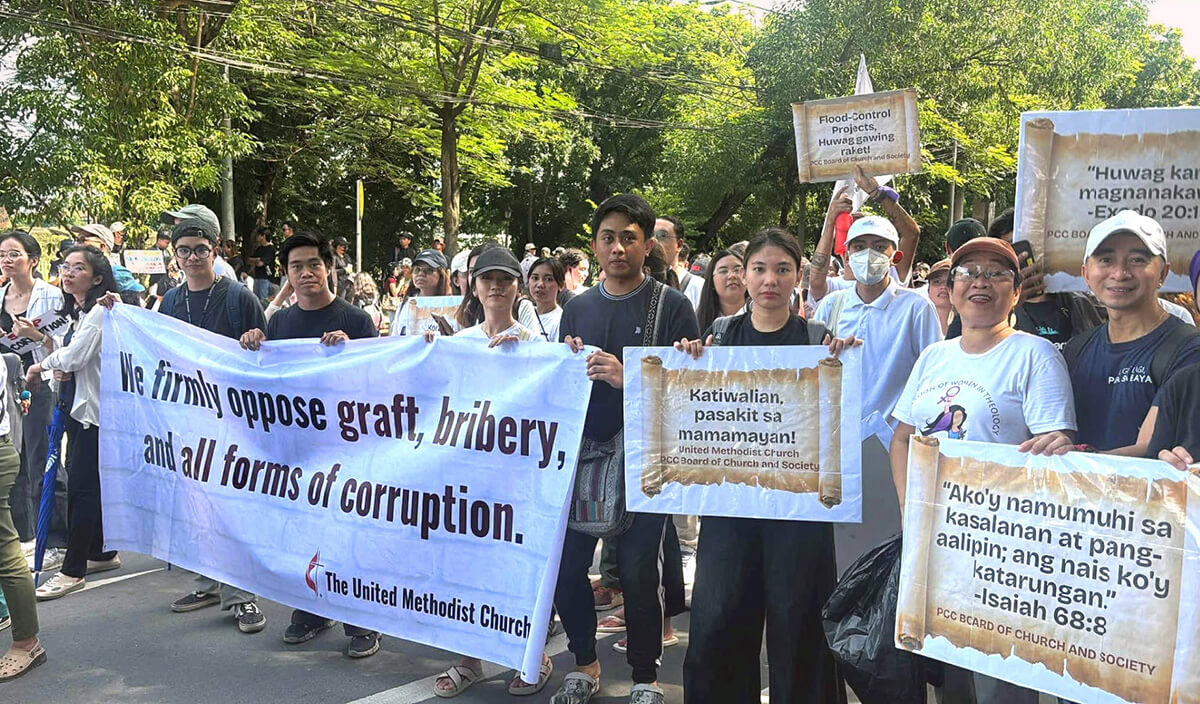Key points:
- About 100,000 demonstrators participated in a call for accountability and transparency by government officials, following allegations of corruption.
- United Methodist leaders were among the protesters, who included representatives of civil society groups and youth organizations as well as other concerned citizens.
- Organizers demanded the return of stolen funds and greater public access to government contracts, along with other steps for increased transparency.
Filipino United Methodists joined about 100,000 protesters in the Trillion Peso March, a call for accountability and transparency amid allegations of large-scale corruption involving government officials.
The demonstrators gathered at Rizal Park in Manila and the EDSA People Power Monument in Quezon City on Sept. 21 for the massive march. Organizers reported more than 50,000 demonstrators at EDSA and around 45,000 at Rizal Park. Protesters carried placards and banners demanding an end to corruption.
Retired Bishop Rodolfo A. Juan, joining other ecumenical clergy and priests on stage, urged participants to pursue righteousness and justice. He called the protest “a sign of unity among churches and denominations” in confronting systemic evil.
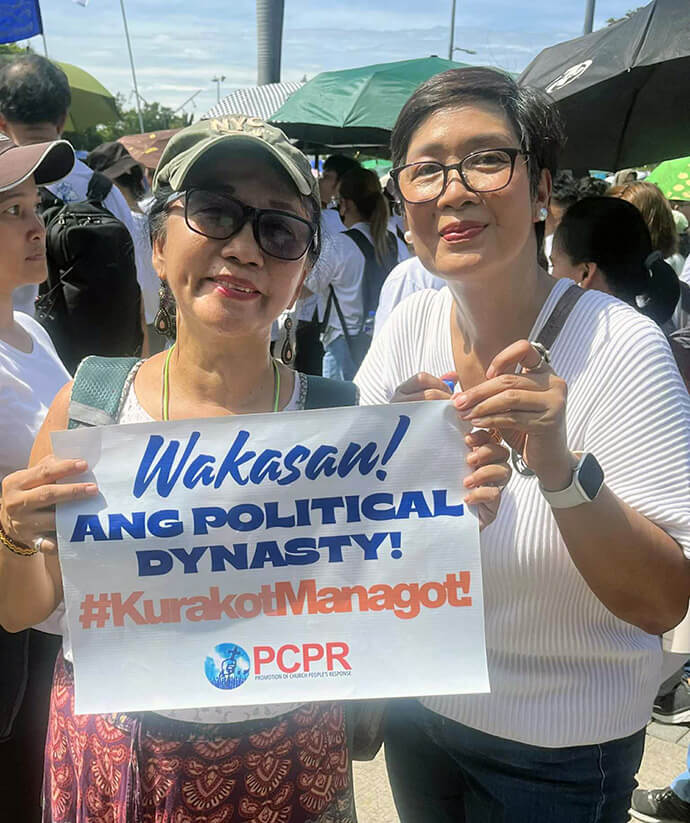
The Rev. Resurrecion Abellano, clergy from South Nueva Ecija Philippines, described the rally as a moral act, affirming that Christians are called to resist corruption and stand for truth.
The rally was “peaceful yet deafening,” said Melvin S. Domingo, conference secretary of the Southwest Philippines. Scandals like anomalous flood control projects have become a tipping point for people’s anger, and the church cannot remain silent, he said. “If we remain silent, we allow the evil, the corrupt, the oppressor to thrive.”
United Methodists hold vigil
United Methodists held a candlelight vigil and a call for prayer in Manila to protest government corruption. Jhoanna Ragasa reports from the site of the vigil at the headquarters for The United Methodist Church along United Nations Avenue in Manila, with photos and video by John Leo Sarmiento and Matthan Bang-Asan for UMC-TV.
Lay member Alvin Paul Azurin, an information technology consultant, called the demonstration “a strong and peaceful show of unity,” noting that corruption deprives people of food, medicine and education. He emphasized that the church must not only pray but also “raise its voice against corruption and stand with those who suffer most from it.”
Deaconess Blessy Grace De Leon, director of communications for The United Methodist Church’s Manila Episcopal Area, stressed that faith communities must never remain silent in the face of injustice.
“The church has a vital role not only in shaping moral convictions but also in moving our so-called ‘Christian nation’ to embody the Gospel in ways that uplift and liberate,” she said. “People expressed their hope through anger and lament, and we do not dismiss this rage. It is born out of deep frustration with failed leadership, but also out of a stubborn hope that change is still possible.”
Deaconess Rubie Joy Alarcon, dormitory manager at Harris Memorial College and deaconess in residence, said she felt moved to act. “It felt like God was calling me out, His voice clear and loud in the cries of His people longing for justice. As a Filipino and a Methodist, I knew in my heart: If I don’t respond, who will?”
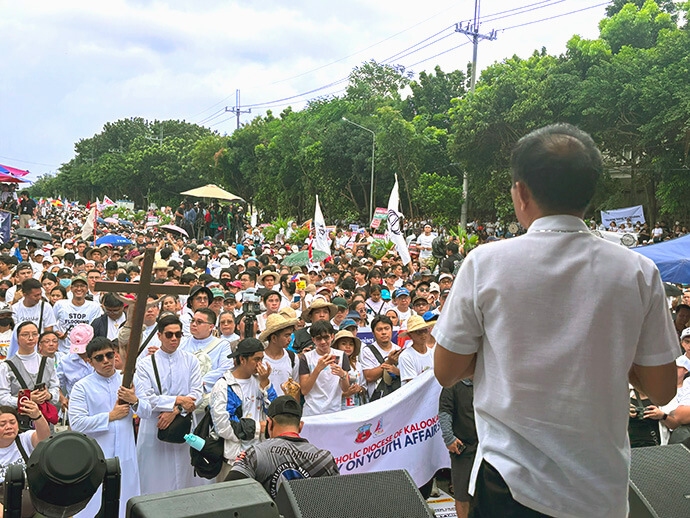
The protesters also included United Methodist Deaconess Norma Dollaga, a longtime social justice advocate and World Methodist Peace Award recipient. “Corruption kills,” she said. “Corruption takes away the present and future of the young. To protest is a logical response.” She emphasized the significance of Sept. 21, both as a remembrance of martial law and a warning that systemic plunder must end. Martial law was declared on that date in 1972.
The Rev. Lizette Tapia-Raquel, dean of Union Theological Seminary, called the demonstration a “powerful symbol of unity.”
“This is the voice of the Filipino people,” Tapia-Raquel said. “We do not get what we deserve, we get what we demand.”
Deaconess Carmi Erika Bumanlag, executive director of Asuncion Perez Memorial Center Inc., described the protest as an “awakening,” saying it reignited hope for the next generation and showed that empowerment lies within the people.
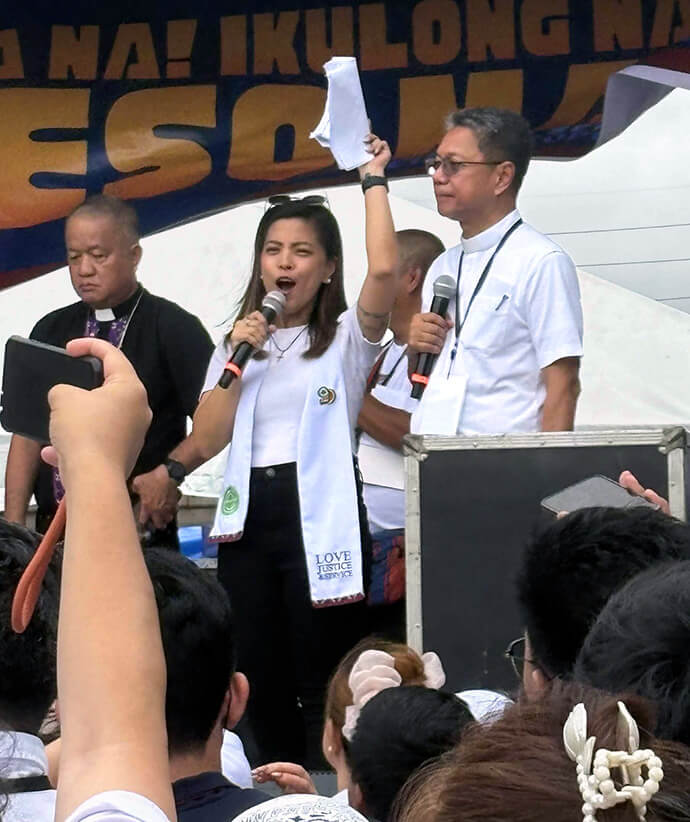
Civil society groups, youth organizations and church leaders stood with ordinary citizens in demanding accountability.
Public anger intensified after revelations that construction contractors Sarah and Pacifico Discaya, who secured flood control contracts, flaunted luxury cars from abroad.
“We firmly oppose graft, bribery and all forms of corruption,” said the Rev. Glofie Baluntong, executive director of the board of church and society for the Philippines Central Conference.
“We are encouraged to express it through our daily lives, our study sessions, our liturgies and even public actions,” she said. “Silence is not our option, and as (a) way of witnessing our faith and Jesus Christ, we are encouraged to go out, let our voices be heard. Let our voice be the voice of the voiceless, for we are United Methodists.”
Organizers released a list of demands, including the return of stolen funds, abolition of pork barrel and confidential funds (public money used by the government in ways that aren’t subject to public scrutiny), mandatory disclosure of SALNs (statements of an individual’s assets, liabilities and net worth) with bank secrecy waivers, public access to contracts and bidding documents, elimination of congressional “insertions” in the national budget and an end to political dynasties.
Subscribe to our
e-newsletter
Two days before the march, the Philippines College of Bishops issued a statement denouncing the corruption and calling on United Methodists to act.
“It is undeniably clear that corruption has been deeply woven into the fabric of governance, intricately tied to business interests for decades. This has deprived our people of the social services that are rightfully theirs,” the bishops stated.
The bishops emphasized the importance of caring for the poor.
“Let righteous indignation stir our compassion for the poor, who remain closest to God’s heart,” they said. “Do not be afraid to denounce evil and to take part in building a more just and humane society.
“We urge all United Methodists and people of goodwill to engage in educating communities by raising awareness and nurturing critical thinking,” the bishops said. “Let us lift up our prophetic voice to call for accountability, and let us not grow weary in doing good for those rendered vulnerable.”
Declaring that the protest was “only the beginning,” organizers vowed continued action until justice and transparency are secured.
Tapia-Raquel urged Christians to remember Christ’s call: “Blessed are the poor. May we be God’s hands and feet as we seek justice for our people.”
“Silence is not an option,” Dollaga added. “By standing with the poor, we stand against corruption.”
Mangiduyos is a UM News correspondent in the Philippines.
News media contact: Julie Dwyer at newsdesk@umnews.org. To read more United Methodist news, subscribe to the free UM News Digests.
